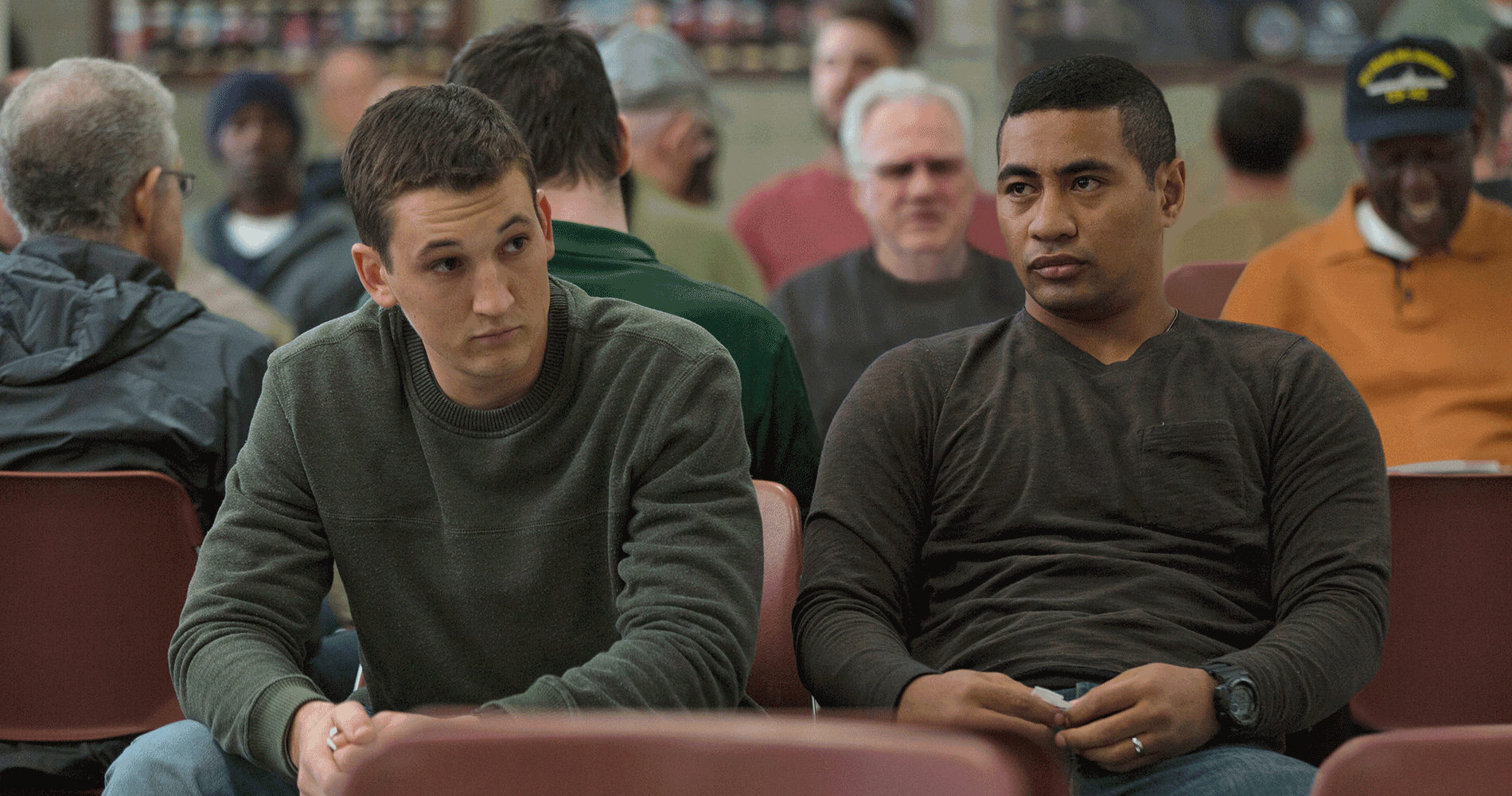Thank You For Your Service
Jason Hall (2017)
[av_image src=’http://jayruud.com/wp-content/uploads/2014/08/Tennyson-180×180.jpg’ attachment=’77’ attachment_size=’square’ align=’left’ animation=’left-to-right’ link=” target=” styling=” caption=’yes’ font_size=” appearance=’on-hover’]
Jason Hall, first-time director of the new film Thank You For Your Service, is perhaps best known for his script for the film American Sniper, a movie that followed the career of Navy S.E.A.L. sniper Chris Kyle, deadliest marksman in U.S. history. In that film, Hall’s script explored Kyle’s difficulties in leaving the Iraq war behind after four tours of duty, and looked as if it was going to be a significant exploration of the struggles of returning veterans, before abruptly brushing off Kyle’s trauma by showing him apparently “cured” after interacting for five minutes with patients at a VA hospital and then degenerating into mindless flag-waving. It was a monumental blown opportunity.
With Hall’s new release, which he also wrote, based loosely on a book of the same title by Pulitzer-prize-winning journalist David Finkel, it appears that he has decided to go back and grab that opportunity by the horns. Still, though the film has had positive reviews, it had a disappointing opening weekend, grossing less than a quarter of the week’s top opener, the poorly reviewed slasher film Jigsaw. Part of the reason for this may be the confusing previews, which make it difficult to see just what the film is about, portraying it as some vaguely patriotic mishmash. Part of the reason may be the complaints heard from veterans’ groups who charge that the film suggests that all veterans are suffering from emotional disorders.
But the film is neither pro-military propaganda nor a denigration of all veterans. It is rather a courageous look at the kinds of problems returning veterans can have rejoining civilian society, the difficulties they may have in readjusting and, most importantly, the difficulties they have getting help from the woefully inadequate services available to them once they have returned.
My father, a veteran of four years in the South Pacific theater in World War II, once told me that the only film he had ever seen that brought him to tears was William Wyler’s The Best Years of Our Lives. That classic 1946 film dealt with the return of three veterans from the war and their sometimes rocky reintegration into civilian life. Most memorable was the readjustment of the veteran played by Harold Russell, himself a veteran who had lost both arms in the war. In 1978, Hal Ashby’s film Coming Home focused on two returning Vietnam War veterans, played by Jon Voight and Bruce Dern, one of whom is paralyzed in a wheelchair and the other suffers from severe post-traumatic stress. Thank You For Your Service aims to be that kind of film for the post-Iraq war generation. It doesn’t quite reach that level, but it deserves credit for trying.
The film concentrates on three returning soldiers from the 2nd Battalion, 16th Infantry, who fought in Iraq in 2007 and took part in some of the fiercest combat of the war. (Therefore, in response to veterans’ groups it only claims to depict the experiences of those troops. Others may or may not have similar experiences.) Chiefly it concentrates on Sgt. Adam Schumann (Miles Teller from Whiplash) and two buddies from his platoon, the American Samoan Tausolo “Solo” Aieti (Beulah Koale, mainly known for TV roles in series like Hawaii Five-0), and Will Waller (Joe Cole of TV’s Peaky Blinders) who does not appear in Finkel’s book.
The film begins with a combat situation shortly before Schumann and his buddies are due to fly home. A routine patrol goes south as one of their group, Emory (played by Scott Haze, currently also appearing in Only the Brave), is shot in the head on a rooftop. Schumann, his sergeant, picks up the body and races down the stairs until, choked by Emory’s blood, he drops the body, causing more damage to Emory’s brain.
The scene lasts only about two minutes. We do return to it later in a flashback that includes a subsequent combat engagement, a scene that lasts perhaps five minutes. These are the only such scenes in the film, but they are included in the trailers for the film, adding to the confusion in the film’s marketing, making it hard for potential audiences to tell what this film is about.
We cut to Schumann, Aieti and Waller on a plane bound for home. Oddly reminiscent of Russell, Frederick March and Dana Andrews flying home at the beginning of The Best Years of Our Lives, this scene like that one involves the characters talking about their plans for coming home. Waller is the most certain: He is going to marry his girlfriend and start a life together. Schumann, a veteran of three tours of duty, has had enough and wants to settle down with his wife and young children. Aieti, who has found himself in the Army, which he says “saved my life,” is leaning toward re-upping, though his wife has other ideas.
When the group arrives home in Kansas, a crowd is waiting to meet them on the tarmac, including Schumann’s wife Saskia (Haley Bennett from The Girl on the Train) and his two small children. She wants the meeting to go perfectly, but before Schumann can get to her he is accosted by Amanda, the wife of First Sergeant Doster (played somewhat surprisingly by a brown-haired Amy Schumer, who after the initial disorientation you realize acquits herself well in this serious role). She wants to know if Schumann knows anything about how her husband died. Momentarily taken aback, Schumann responds quickly that he “wasn’t there.” But the question of what happened to Doser comes up again and again, and it forms a kind of connecting thread that holds together the loose ends of the plot, which otherwise is fairly episodic.
The first life to unravel is Waller’s, who gets home to find that his girlfriend has left him, taken his furniture, and cleaned out his bank accounts. It is every GI’s nightmare. Schumann, the platoon’s sergeant in Iraq, still feels the need to look out for his boys at home, and brings Waller home to sleep on his couch. But there’s only so much he can do to protect Waller from his own destructive impulses.
Aieti is having nightmares—and waking visions—of what happened to Doser. He also has some brain damage from being too close to explosions more than once. He only wants to re-enlist, but his damage will likely prevent him from doing so. In a movingly revealing moment, he sees a the VA a soldier who has lost a limb, and wishes that his own psychic wounds were that obvious, so that people would better understand his condition.
Schumann seems the least affected by his service, but we soon come to realize he is better at hiding his wounds, which chiefly involve survivor’s guilt over his dropping of Emory and, of course, over what happened to Doser (which we do, eventually, find out). He cannot open up to his wife, despite all her efforts, and when he and Solo attempt to get help at the VA, they are stymied by bureaucracy, woefully understaffed and underfunded programs, and senior officers who are either unconcerned (like the officer who’s more interested in buying steaks on the Internet than in helping get Solo his benefits) or hostile (like the one who tells Schumann he shouldn’t be applying for mental health benefits because it makes the Army look bad). It may take up to nine months, they are old, before they can get any real help.
This is the point at which the irony of the film’s title becomes clear: “Thank you for your service” has become a standard greeting to servicemen and women as a token of respect for what they do. It is, literally, the least that we can do. But the same politicians who are so vocal about such statements, those who, for example, make histrionic speeches about how football players kneeling during the national anthem are somehow “disrespecting the troops,” are precisely the same ones who vote down any increases or improvements to veterans’ benefits when the time comes to put their money where their mouths are.
Unfortunately this potentially scathing indictment of our government’s shameful neglect of veterans goes off the rails in the last reel. Veering away from Finkel’s book, the plot suddenly focuses on Solo becoming involved with a criminal named Dante (Omar Dorsey of Selma), who supplies him with drugs in exchange for making a dangerous delivery for him. It’s as if the film suddenly forgot what it was and decided it needed to make a nod toward Hollywood. Ultimately Schumann steps in and gives Solo a shot at a place in a live-in care facility. For himself, he finds a way to begin confronting his issues with both Emory and Doser. But as a doctor tells Schumann at one point, “There is no cure for trauma, you just have to learn to manage it.” This will be the challenge for both him and Solo.
Teller gives a very powerful performance here, as does Koale. They are best when they are together. One of the finest touches in the film involves a pit bull that Solo has rescued from a dogfight. He brings the dog to Schumann, who stitches up his wounds, and though his wife object to having the dog in the house, the wounded warrior is house pet by the end. It’s a touching and hopeful metaphor for the wounded human warriors that are the film’s focus.
Three Tennysons for this one—the rating lower than it might have been because of that ill-conceived venture into the Hollywood-land of crooks and car-chases.
And by the way, if you like reading these reviews, you might be interested in Jay Ruud’s new “Merlin Mystery” novel, the third in the series, which will be released on November 10 and now available for pre-ordering on Amazon and on Barnes and Noble:
When word comes to Camelot that Sir Tristram has died in Brittany of wounds suffered in a skirmish, and that his longtime mistress, La Belle Isolde, Queen of Cornwall, has subsequently died herself of a broken heart, Queen Guinevere and her trusted lady Rosemounde immediately suspect that there is more to the story of the lovers’ deaths than they are being told. It is up to Merlin and his faithful assistant, Gildas of Cornwall, to find the truth behind the myths and half-truths surrounding these untimely deaths. By the time they are finally able to uncover the truth, Gildas and Merlin have lost one companion and are in danger of losing their own lives.
Pre-order from Amazon here: https://www.amazon.com/Bleak-Empty-Sea-Tristram-Mystery/dp/1893035735/ref=sr_1_1?s=books&ie=UTF8&qid=1503328086&sr=1-1&keywords=Bleak+and+Empty+Sea
Pre-order from Barnes and Noble here: https://www.barnesandnoble.com/w/the-bleak-and-empty-sea-jay-ruud/1126958139?ean=9781893035737


